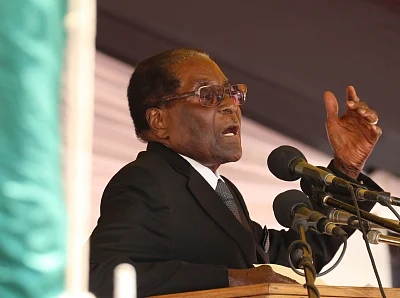Harare, Sep 6 (IANS) Former Zimbabwean President Robert Mugabe, a "hero" of the independence struggle against British colonial rule who later became an iron-fisted ruler, has died at the age of 95 in a Singapore hospital, where he had been receiving treatment.
The nonagenarian leader, seen by the West as an unrepentant dictator eventually overthrown by his own military at the end of 2017, had been hospitalized in the Asian country since April.
For a country still struggling by the economic crisis the long-serving President left behind, news of Mugabe's death awoke bitter memories of a man who went from being the nation's father figure to one of the greatest examples of an anti-colonial hero who, once in power, turned to autocracy.
The son of a carpenter and a teacher, Mugabe was born on February 21, 1924 near Harare, in what was then Southern Rhodesia, a British colony.
Mugabe waded into politics aged 36 and got involved with several groups engaged in the incipient Zimbabwean independence struggle against the UK, for which he was imprisoned in 1964.
He spent a decade behind bars and was later obliged to live in exile. In 1979, he signed the Lancaster House Agreement which paved the way for an independent Zimbabwe.
In the country's first post-colonial elections, Mugabe became Prime Minister, a post that was abolished in 1987 to create the office of President.
He enjoyed that position for the next three decades thanks to some questionable elections and the systematic repression of his opponents, reported Efe news.
During his tenure, Mugabe entered controversy with his order in 2000 to expropriate thousands of farms from white farmers for redistribution among the black population.
He had a taste for harsh rhetoric and would label his critics "traitors".
Mugabe blamed internal problems, like the floundering economy, on international sanctions and took aim at the US and the UK, accusing them of fabricating lies about him.
His views on the LGBT community also attracted a wealth of critics after he said gay people were worse than "dogs and pigs".
Aware of the need for change and perhaps appeased by old age, in his last years in power Mugabe -- a devout Catholic -- began a campaign to try to transform his image.
In several interviews, he was affable, spoke fondly of his four children and admitted the love he felt for his wife, Grace (40 years younger), in addition to remembering his first wife, Sally, who died in 1992.
Meanwhile, rumours about his ill health endured and in his public appearances he was always clinging to his wife's arm, a woman with political ambition to whom the historical comrades of his party - the National African Union of Zimbabwe - Patriotic Front (ZANU-PF) - regarded with suspicion.
At the age of 93, Mugabe announced his intention to run in elections again and everything seemed to indicate that nothing was going to change for Zimbabwe in the short term, until November 14, 2017 when military tanks rolled into the capital, Harare.
That same night, the Army's high command took control of the country. Mugabe and his family were unharmed but were placed under house arrest.
The trigger for the takeover was Mugabe's dismissal of the erstwhile vice-President Emmerson Mnangagwa, who is the current President.
Mugabe did not relinquish power until November 21, when his ouster was confirmed by a successful no-confidence motion tabled by his own party.
Following his resignation, Mugabe's public appearances were limited, although, in one interview with South African public TV channel SABC, he labelled his ouster as a "coup d'état".
--IANS
soni/
(At The Quint, we question everything. Play an active role in shaping our journalism by becoming a member today.)
